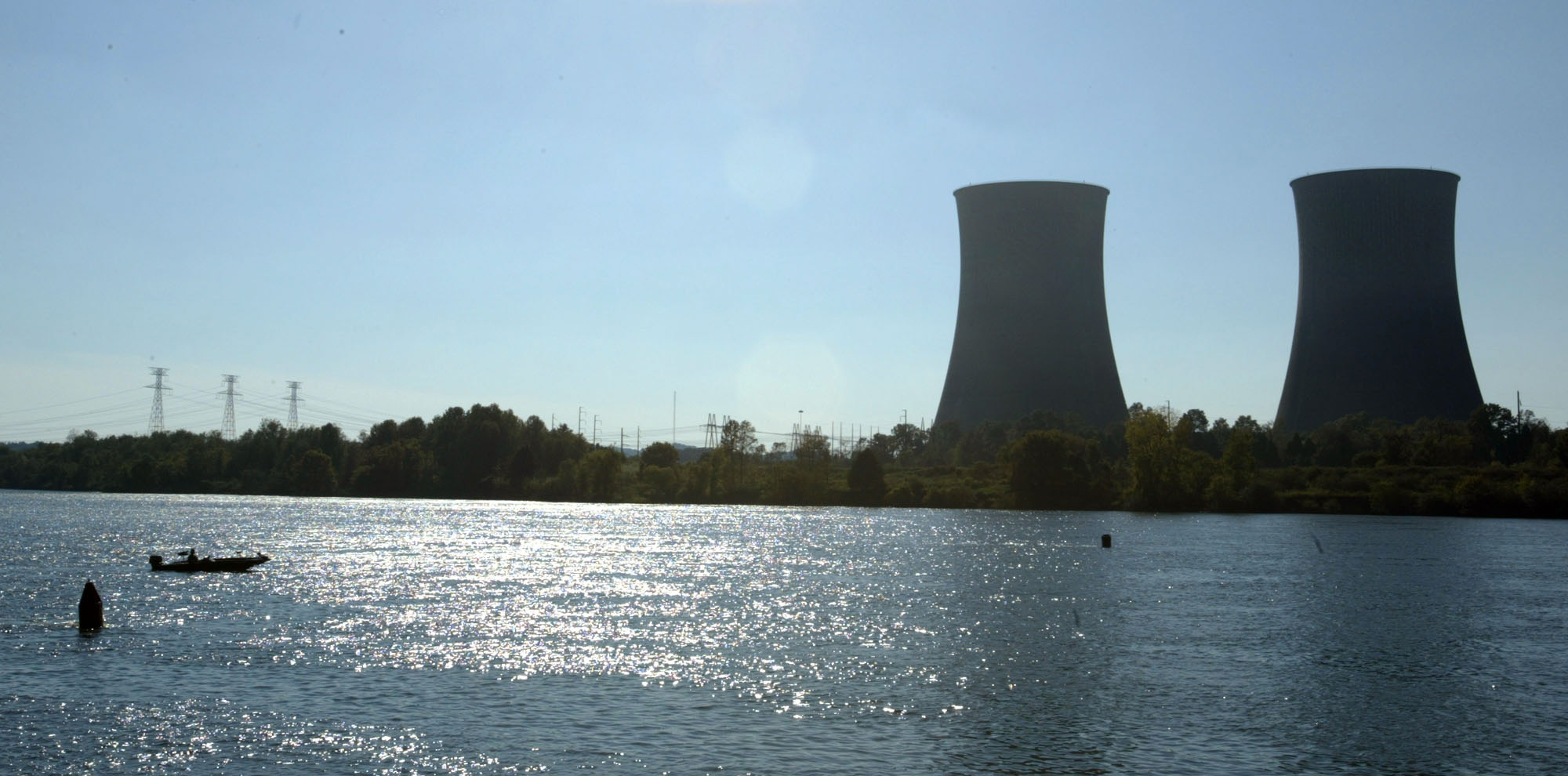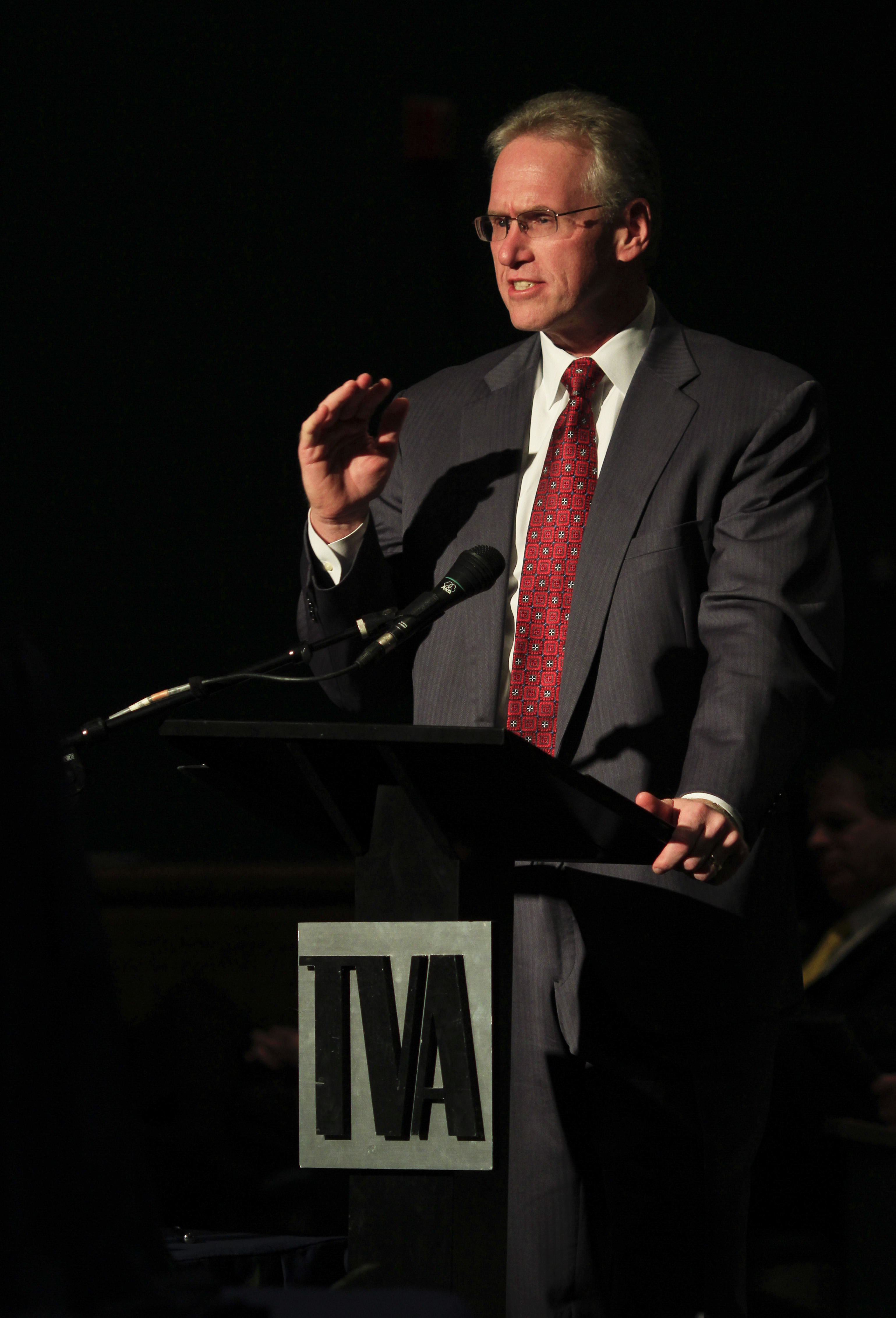The Tennessee Valley Authority backed away from the nuclear plant design that is proving costly at Plant Vogtle in Georgia, but the federal utility still is leading the nation in pursuing more nuclear power.
TVA is finishing one reactor and considering completing two others that are the last of the previous generation of nuclear plants begun before the 1979 accident at Three Mile Island. Although TVA deferred its original plan to build one of the first of the next generation reactor designs in Alabama, utility officials announced an agreement last week to pursue a construction permit to build an even more innovative reactor in Oak Ridge as soon as 2022, pending regulatory and board approval.
TVA's newly hired chief executive, Bill Johnson, says he supports nuclear power and the new designs. But he said the industry needs to do a better job planning and managing such projects to control their costs.
"I am a believer in nuclear power, but frankly our history is pretty spotty," Johnson told reporters during his first news conference after becoming TVA CEO in January. "If you look back at the 1970s and '80s, the estimates on those plants and the actual completion costs varied greatly."
Much of those increases stemmed from the lack of standardized design and changing regulations after the nuclear plant accident at Three Mile Island, Johnson said.
"We know a lot more today than we did then, and our project management tools are better, but it is still a tremendous challenge," said Johnson, a former CEO at Progress Energy and Duke Energy. "Vogtle [projected to cost a record $14 billion for two more units] certainly has had quality and cost challenges."
TVA also has had its share of costly building problems in trying to finish the Watts Bar plant near Spring City, Tenn. Unit 1 at Watts Bar was completed in 1996 at a cost of more than $6 billion -- or 10 times more than the original estimate when construction began in 1973. Construction was suspended at Watts Bar in 1985 after workers complained about safety violations, and the resurrected Unit 2 project that was budgeted to cost $2.5 billion for completion last year had to be pushed back until 2015. That could add another $2 billion to the cost of the project.
Johnson says the key to success in building nuclear plants is to do extensive design work before you begin building and then to make sure you have the right people and teams to build the units.
"That project [completion of the Unit 2 reactor] is getting an intense amount of scrutiny from the board, from outside consultants, from the nuclear construction group and from everyone at TVA," he said. "The importance of this is high, and we need to get this done right."
Johnson told the TVA board earlier this month that the Watts Bar project "is right now on schedule, and I hope we do better than our schedule and better than our budget."
While finishing Watts Bar, TVA also is developing plans to complete its unfinished Bellefonte Nuclear Plant in Hollywood, Ala., and is pursuing a construction permit to build up to four of the new small modular reactors in Oak Ridge.
Plotting the future
Any decision on those additional reactors will be shaped by a new power planning study TVA plans to launch later this year. Over the next 18 months, TVA staff and customer and environmental groups will review energy needs in the Tennessee Valley to write a new Integrated Resource Plan.
One of those who served on a review panel for the previous major TVA power plan, Dr. Stephen Smith, questions whether either Bellefonte or the small modular reactors can ever be economically justified.
"Bellefonte is 1970s technology that has not been maintained or preserved while the small modular reactor design is still a speculative idea that has yet to be approved," said Smith, the executive director at the Southern Alliance for Clean Energy, a Knoxville-based environmental group. "TVA may be spending a lot to pursue these projects, but in the end they just can't be justified on a cost basis and, if attempted, will only end up costing the ratepayers and customers of TVA a tremendous amount of money."
But the projects have gained local support from communities in Jackson County, Ala., and Oak Ridge, Tenn., eager for the jobs and investment. Tennessee's congressional delegation also has voiced support for TVA's contract to pursue the small modular reactor project, known as mPower, with Babcock & Wilcox and Bechtel Corp.
U.S. Sen. Lamar Alexander, the Tennessee Republican who has urged utilities to build 100 more nuclear reactors to power America, said the small modular reactor TVA has agreed to pursue is "exactly the kind of clean, reliable, safe and low-cost electricity the Tennessee Valley needs." U.S. Sen. Bob Corker, R-Tenn., said TVA's contract with the B&W and Bechtel to support the new mPower "will hopefully be the beginning of a new surge in safe, clean and affordable nuclear power." Corker said he is proud that Tennessee "is advancing proven technologies."
The U.S. Department of Energy has agreed to pay for half of the cost of developing and licensing the new reactor design, which B&W hopes to gain approval of from the Nuclear Regulatory Commission by 2015. Smith questioned why Alexander and Corker have backed taxpayer-funded new technologies that could end up costing TVA ratepayers more money while claiming they don't want to pick energy winners or losers and urging TVA's board to focus first on low-cost power.
"These decisions absolutely cry out for revision and review, and I'm confident when all the facts are in that these plants will never be built unless the nuclear zealots push them through without adequate review," he said. "I know the Oak Ridge community has never met a nuclear project that they didn't love. But while people are entitled to their own opinions, they are not entitled to their own facts."
Bellefonte future
Johnson said TVA continues to study and develop plans to finish the Bellefonte nuclear plant, which is similar to the Babcock & Wilcox reactor at the Crystal River plant in Florida that Duke Energy Co. just decided to shut down.
"[At Bellefonte], we want to make sure we have enough engineering done and enough knowledge to have an estimate and a schedule that we can say this is real and we can do this," Johnson said. "I worry about any major project that requires a lot of capital, a lot of time and a lot of people because they are just hard to do well. There are few things we could do for our customers that will matter more than to do these things well."
Johnson says TVA is taking the right approach now at its Watts Bar Nuclear Plant. "People are working well together and we've learned our lessons there," he said. "That should make Bellefonte a lot easier. But we have a lot of learning to do before we increase the pace of Bellefonte."


